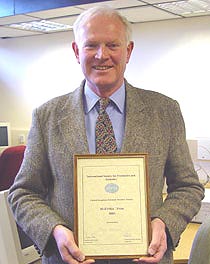Computing expert charts amputees’ rehabilitation
15/03/04
Computing expert charts amputees’ rehabilitation
 New research could reduce the recovery time for lower limb amputees by helping health professionals chart patients’ progress more easily. Tom Geake, from Kingston’s Mobile Information and Network Technologies Research Centre, has designed a new method of interpreting results from the locomotor capabilities index, used by clinicians to assess amputees’ improvement in the four-week period after they have been fitted with a socket and artificial limb.
New research could reduce the recovery time for lower limb amputees by helping health professionals chart patients’ progress more easily. Tom Geake, from Kingston’s Mobile Information and Network Technologies Research Centre, has designed a new method of interpreting results from the locomotor capabilities index, used by clinicians to assess amputees’ improvement in the four-week period after they have been fitted with a socket and artificial limb.
Using the index, amputees are set goals at the start of their rehabilitation programme which are later reviewed to see how much progress has been made. Patients are assessed on 14 activities, ranging from basic tasks such as rising from a chair to more advanced tasks such as walking outside on uneven ground. Their capability is recorded on a scale of 0-3.
Until now there had been no simple method for therapists to analyse the data gathered, Mr Geake said. His research has produced a new system using colour and shape on patients’ charts to improve the process. “Time is scarce in the NHS, so the faster a clinician can assess a person’s rehabilitation the better,†Mr Geake said. “Rather than having to think about what each figure tells them, the system allows the therapist to see at a glance which goals have been reached from the colour and shape they see on the chart. They can draw conclusions more easily about the patient’s progress and, if necessary, suggest changes to their recovery programme.†Another advantage is that patients can also understand the contents. “Seeing which activities they need to concentrate on to achieve their goals helps them become more motivated – a key factor in their rehabilitation,†Mr Geake said.
The research was commissioned by Dr Rajiv Hanspal, a consultant in rehabilitation medicine at the Royal National Orthopaedic Hospital. Dr Hanspal’s colleague, senior physiotherapist Jennifer Fulton, and Dr David Wertheim from the University’s School of Computing and Information Systems were also involved in the project.
Mr Geake presented the research at the National Scientific Meeting of the International Society for Prosthetics and Orthotics, where he was awarded the British Limbless Ex-Servicemen’s Association prize. He is due to outline his findings to NHS representatives with a view to further trials of the system.